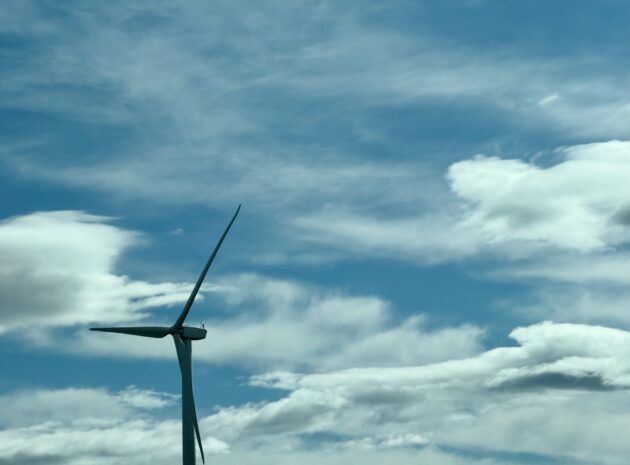As Congress wrestles over the deeply polarizing domestic policy bill championed by President Trump, Washington state leaders and entrepreneurs are raising concerns about the law’s provisions that unwind progress on clean energy.
The House and Senate have passed slightly different versions of the tax-and-spending cuts mega bill. On the energy front, the variations are mostly around timelines for ending tax breaks that support the growth of clean energy companies and the deployment of clean power plants.
“When it comes to the all-out assault on clean energy in this bill, even [Tesla founder and former head of the Department of Government Efficiency] Elon Musk understands the plain facts of the matter — Republicans’ cuts are ‘utterly insane and destructive’ and will ‘destroy millions of jobs in America,’” said Sen. Patty Murray, D-Wash., citing comments from Musk.
Murray issued the statement following the Senate’s split vote on the bill Tuesday morning, which required Vice President JD Vance to cast the tie-breaking vote. Trump and other GOP leaders defend the bill as cutting wasteful spending on clean energy subsidies approved under the Biden Administration.
U.S. lawmakers now need to reconcile the differences in the legislation to get it to President Trump’s desk.
Business and nonprofit leaders in Washington state are waiting to see how the bill shakes out. The Pacific Northwest is home to dozens of climate-related businesses large and small that operate in Republican- and Democratic-leaning communities. That includes companies in next-gen battery materials, sustainable aviation, nuclear fission and fusion, carbon removal and other technologies.
The legislation “harms the economy, slashes jobs, and increases costs for consumers,” said Michael Mann, executive director of the climate-focused nonprofit Clean & Prosperous Washington. “It undermines Washington’s competitiveness on a global scale, and cedes innovation and clean energy leadership to other countries.”
Energy installations imperiled
Seattle-based Ever.green has software to match corporations looking reduce their carbon footprints with developers that need funding to build clean energy plants.
Passage of this bill “would be a significant setback for the clean energy transition,” said Ever.green CEO Cris Eugster, by email, who called it “a direct attack on the wind and solar industries in the United States.”
“This comes at a time when renewables are the only new generation source that can scale quickly enough to meet rising electricity demand,” he added. “We are already off-track on our climate goals, and this would only accelerate tipping points towards worst-case scenarios.”
Electricity use is rising, driven in part by the rapid expansion of power-hungry data centers needed to support the artificial intelligence boom.
The bill’s energy provisions include:
- Quickly phasing out tax credits for large-scale wind and solar projects, and more slowly removing those for nuclear, geothermal and battery deployments.
- Quickly cancelling tax credits for companies making clean hydrogen fuel.
- Eliminating tax credits for consumers for installing rooftop solar, electric heat pumps and other energy-saving technologies by the end of the year.
- Nixing the $7,500 electric vehicle credit by September in the Senate bill, or the year’s end in the House version; removing the commercial clean vehicles credit.
- Extending the credit for clean biofuel production.
LevelTen Energy is also in the business of helping corporations, utilities, universities and others provide funding for new clean energy projects on its global platform.
“Right now is a meaningful moment for the clean energy industry,” said Rob Collier, LevelTen’s senior vice president of marketplaces, by email. “As with any major policy shift, developers are reassessing project timelines, costs, and long-term viability. We’re seeing increased urgency around projects that remain viable under current rules.”
The Seattle startup launched in 2016, shortly before President Trump started his first term. Collier emphasized that the clean energy transition “is a long game” and that the company is focused on navigating market change.
Mixed results for batteries
Electric vehicles took multiple hits in the legislation, removing incentives for individuals and companies looking to buy EVs. That, combined with the phasing out of tax credits for big battery installations, threatens to dampen demand for battery materials.
Next-gen battery materials company Group14 Technologies this week laid off an undisclosed number of workers as it’s slowing the start of production at a giant facility in Eastern Washington’s Moses Lake. The company cited “shifts in demand and uncertainties in global trade relationships” as the cause.
But battery competitor Sila is moving ahead with the commissioning of its mass-scale plant in Moses Lake and aims to start production by year’s end. Sila and Group14 are manufacturing their own unique silicon anode materials for better performance in lithium-ion batteries.
Helena Schwarz, director of government affairs for the company, had an upbeat take on the legislation’s impacts, noting that silicon anode materials are used to replace graphite, which is primarily supplied by China.
“The current legislative package aims to reduce reliance on China for battery components and critical minerals by limiting federal support to U.S. production [that is] free of Chinese influence,” Schwarz said by email. “Sila is well-positioned for success under the legislation.”
Impacts on carbon removal
Innovators in carbon removal — which pulls CO2 from the air or captures it from industrial operations — were glad for measures in the Senate version of the bill that restored incentives helping the nascent sector.
A spokesperson for CarbonQuest, a Spokane, Wash., startup building carbon capture devices, said the Senate’s legislation supports a variety of uses for captured carbon, including its use in synthetic fuels that replace oil and gas and trapping it in concrete.
Putting these approaches on par with other carbon sequestration solutions, the spokesperson said, “will scale green concrete, alternative jet fuel, materials that displace plastic, and other green circular economies.”
The company did have concerns about penalties for supply-chain goods coming from abroad, and the bill’s “drastic rollback of incentives for renewable energy, such as wind and solar.”
“Our hope is that the final bill allows for an all-of-the-above energy policy,” said the CarbonQuest spokesperson, “and that the rules make the tax credits workable and meaningful.”
Read the full article here










